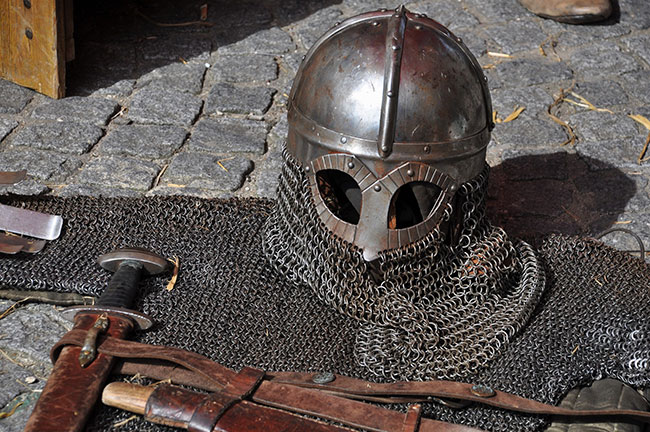Threats of violence
“The worldlings are armed with steel and iron, but the Christians are armed with the armor of God, with truth, righteousness, peace, faith, salvation, and the Word of God.” —Schleitheim Confession

by Michelle Curtis, CHI intern
A couple months ago, my pastor gave a children’s sermon in my Mennonite church and asked the kids: What do you do when someone hits you? Without missing a beat, a child replied loud enough for the whole congregation to hear: “Hit them back!” We all laughed in appreciation of this child’s bluntness. The pastor encouraged the children to come up with some responses that would better suit our pacifist tradition; but in later conversations, I heard other adults wondering aloud if our laughter unwittingly encouraged the child to return hit for hit, iron for iron, gunshot for gunshot.

What sort of armor do we wear?
The quote above from the early Anabaptist confession at Schleitheim (1527) rings strikingly pertinent in our world today, when some Christian leaders claim that safety requires Christians to arm themselves with concealed guns. Just like today, fear and death were rampant in the 16th century. All of Europe feared the Turks overcoming Vienna and thereby gaining access to conquer Western Europe. At the same time, Christians within Europe were killing one another. Just two years earlier, 100,000 perished in the German Peasants’ Revolt, and Anabaptists themselves were already facing execution for their faith.
It’s tempting to believe that the only way to fight steel and iron, terrorism and gun violence, is with more drones, more air strikes, more concealed carry guns, more weapons than the “worldlings.” And yet, Romans 12 instructs us not to repay evil with evil but rather to overcome evil with good.
Anabaptists were not popular in their own day. They were persecuted and killed by Protestants and Catholics alike. And their ideas about pacifism (the rejection of all violence) remain largely unpopular in our own day. Despite the success of numerous nonviolent resistance movements throughout the 20th c. such as the Civil Rights Movement, it is still difficult for many of us to believe that what the Anabaptists at Schleitheim called “the armor of God” is effective against the worldly weapons that threaten our safety. Even for self-identifying Mennonites, it’s often easier to side with the child who answered “hit them back” than with our Anabaptist forebears who sometimes lost their lives for refusing to use violence.
No matter how you view pacifism, I think the historic Anabaptists raise important questions for all Christians today: What does it mean to equip ourselves with the armor of God (Eph. 6:10–17)? And how does Christ call us to respond to threats of violence in our own time?
Michelle Curtis is a Christian History intern and seminary student.
For more on how Anabaptists have historically responded during times of war, see our article on the conscientious objectors in the latest issue of Christian HIstory magazine, Faith in the Foxholes, featuring the story of Christianity during World Wars I and II.
(Join us each Thursday for a fresh look at a quote from the Reformation era! Sign up via our e-newsletter (in the box at the right) or through our RSS feed (above), or follow us on Facebook for the next year as we celebrate 500 years of Reformation.)



